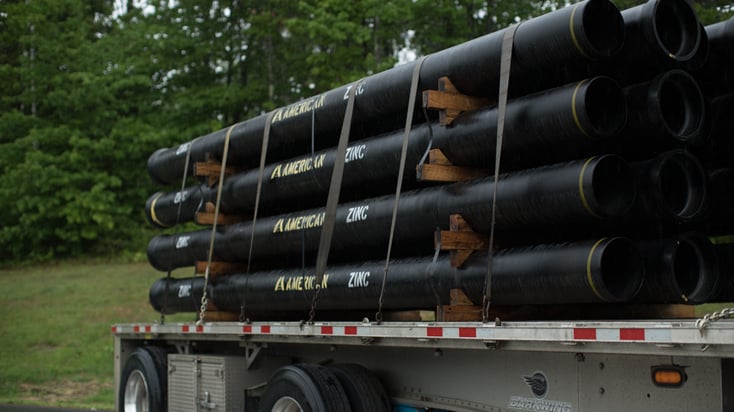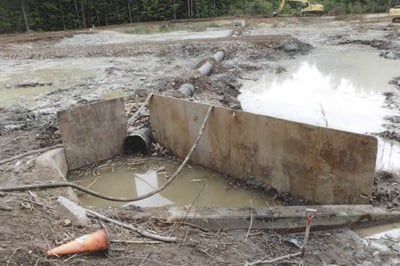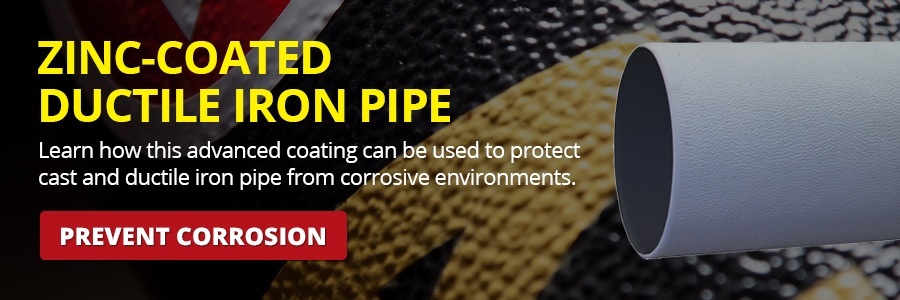Zinc pipe: What Customers Need to Know About Zinc Pipe
- Home
- Team EJP Blog
- Zinc pipe: What Customers Need to Know About Zinc Pipe
- Feb 25, 2016 8:28:31 AM
- Everett J. Prescott

Though federal regulations provide strict limitations to what compounds are acceptable in potable water, the increasing interest in water filtration and potential water contamination often leaves customers curious or concerned about what's in their drinking water, often above and beyond what is really concerning. Though the primary concerns deal with lead or bacteria, some waterworks customers are starting to ask questions about the safety of zinc in their water supply. Here are some easy answer to common concerns raised by waterworks customers over the use of zinc in water pipes, fittings and fixtures.
Can zinc in pipes end up in my water?
Though this is an area of concern for people on private wells, zinc doesn't leach from waterworks pipes. Why? To leach zinc from the pipes, the water has to be fairly acidic to start with. Though private wells are not treated to adjust the water's pH, waterworks companies must adjust the pH as part of the water treatment process, changing even acidic water to a more neutral pH. Even the chlorine that is so commonly used to treat water is very alkaline, which is the main source of pH adjustment in most locations.
What about corrosion?
The galvanization process adds zinc to the surface of the pipe, which is a treatment to prevent rust. As mentioned above, zinc is only corroded by acidic water, so unless you're on a private well, you should be fine as the water becomes more alkaline as it's treated before being sent through the municipality's water mains.
Is zinc harmful to my health?
 If you have clients who are on private wells or for whatever other reason have acidic water that has been left untreated, zinc leaching into the water isn't really the biggest concern with galvanized pipes. In fact, zinc is considered a secondary contaminant by the EPA at levels above 5 mg per liter due to the off flavor it gives the water, not because of any particular health risk. In addition to iron and zinc, galvanized materials can contain contamination of lead and cadmium, both dangerous heavy metals that are far more toxic than zinc.
If you have clients who are on private wells or for whatever other reason have acidic water that has been left untreated, zinc leaching into the water isn't really the biggest concern with galvanized pipes. In fact, zinc is considered a secondary contaminant by the EPA at levels above 5 mg per liter due to the off flavor it gives the water, not because of any particular health risk. In addition to iron and zinc, galvanized materials can contain contamination of lead and cadmium, both dangerous heavy metals that are far more toxic than zinc.
How can I tell if I'm having leaching problems with my water and pipes?
Though testing is the first step to find out exactly what is in your water, higher concentrations of zinc will have a bitter, astringent taste. If you're noticing this type of flavor in your drinking water on a regular basis, it's important that you pursue having your water tested. Many local and county health departments provide water testing services for a fairly low fee, as do multiple businesses on the internet.
Can I have problems with leaching chemicals if my pipes aren't metal?
This is a common misconception, but even PVC or cement pipes will leach some amount of material. Why? Because all pipe material will corrode to a certain extent, causing leaching problems. That being said, these materials wouldn't be allowed for use in waterworks if they had not already been tested and found to be within safe limits for drinking water.
Now that you have some answers for customers who are concerned about their potable water purity and safety, you'll be well prepared for the next set of questions your customers are worried about. At Team EJP, we're dedicated to helping you find the solutions you need, whether it's information gathering or determining the perfect solution to your particular waterworks or industrial problem. Please contact us today with any questions, concerns or for further information on any of our high-quality products.








